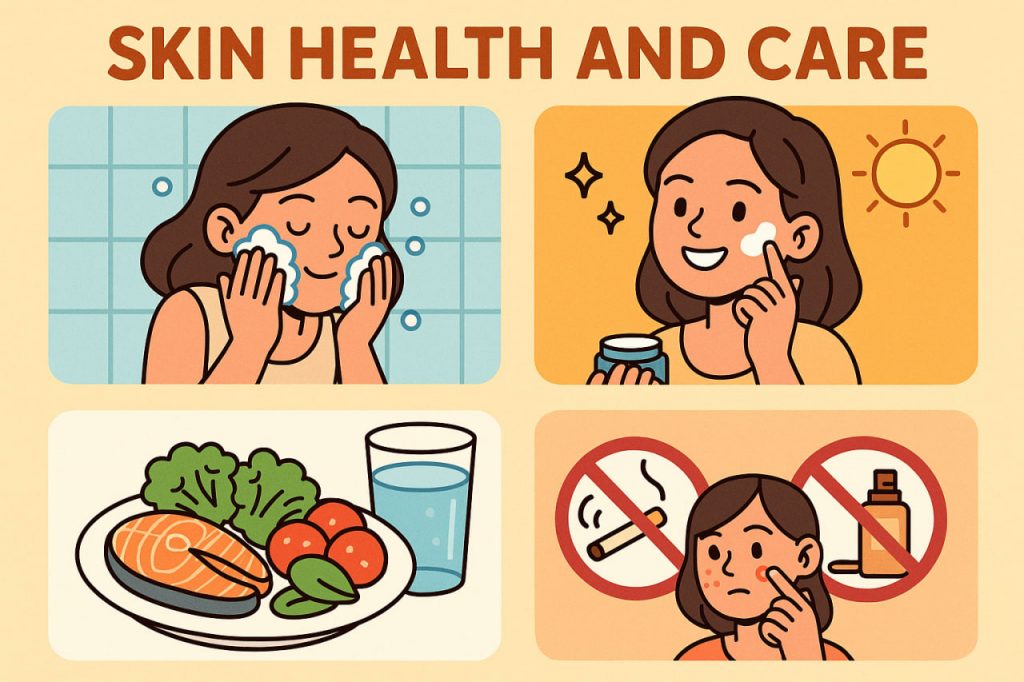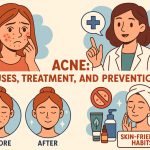Healthy skin is more than just a sign of beauty—it reflects your overall well-being. Your skin protects you from environmental hazards, helps regulate body temperature, and enables the sense of touch. Taking care of your skin is essential not only for appearance but also for its vital physiological roles.
Daily Skin Care Habits
Developing consistent daily habits is the foundation of skin health. Cleansing your face twice a day helps remove excess oil, pollutants, and dead skin cells. Use lukewarm water and a mild, pH-balanced cleanser that suits your skin type. Overwashing or using harsh soaps can strip away natural oils, leading to dryness or irritation. Moisturizing after cleansing keeps the skin hydrated and supports the skin barrier.
Sunscreen is a critical step even on cloudy days or in winter. A broad-spectrum sunscreen with SPF 30 or higher protects against both UVA and UVB rays, preventing premature aging, dark spots, and skin cancer.
Nutrition and Hydration
What you eat has a significant impact on your skin. A diet rich in antioxidants (like vitamins C and E), omega-3 fatty acids, and plant-based foods can improve elasticity and reduce inflammation. Drink plenty of water throughout the day to maintain hydration, which helps your skin stay plump and smooth.
Avoid excessive sugar, processed foods, and alcohol, which can contribute to skin problems like acne or dullness. Foods such as leafy greens, nuts, berries, and oily fish support the skin’s structure and function.
Sleep and Stress Management
Sleep gives your skin time to repair itself. During deep sleep, the body increases blood flow to the skin and produces collagen, helping reduce wrinkles and giving a healthy glow. Aim for 7–9 hours of quality sleep each night.
Chronic stress increases cortisol, a hormone that can worsen acne, eczema, and other skin conditions. Practice stress-reduction techniques such as meditation, breathing exercises, or physical activity to support both mental and skin health.
Avoiding Skin-Damaging Habits
Certain habits can damage your skin over time. Smoking reduces blood flow and depletes the skin of oxygen and nutrients, leading to wrinkles and a dull complexion. Picking at pimples or touching your face frequently introduces bacteria and causes inflammation or scarring.
Always remove makeup before bed to prevent clogged pores and irritation. Choose non-comedogenic products that don’t block pores, especially if you have oily or acne-prone skin.
Adjusting for Age and Environment
As we age, the skin becomes thinner, drier, and less elastic. Adjust your skincare routine to include more hydrating and nourishing products, like hyaluronic acid or ceramide-rich creams. Consider antioxidants and gentle retinoids to support cell turnover.
If you live in a dry or cold climate, use a humidifier indoors and thicker moisturizers to combat environmental stressors. In polluted urban areas, consider antioxidants and barrier-strengthening skincare.
When to See a Dermatologist
If you have persistent skin issues such as acne, eczema, psoriasis, or unusual moles, consult a certified dermatologist. Early detection and professional treatment can prevent complications. Dermatologists can also provide personalized guidance on skin aging, allergies, or treatments like chemical peels or laser therapy.
Glossary
- Broad-spectrum sunscreen – A sunscreen that protects against both UVA (aging rays) and UVB (burning rays).
- Non-comedogenic – Products that are formulated not to block skin pores.
- Cortisol – A hormone released in response to stress; high levels can affect the skin.
- Retinoids – Vitamin A derivatives used to increase cell turnover and reduce signs of aging or acne.
- Ceramides – Lipid molecules that help restore the skin’s protective barrier.
- Hyaluronic acid – A hydrating substance naturally found in the skin that helps retain moisture.


